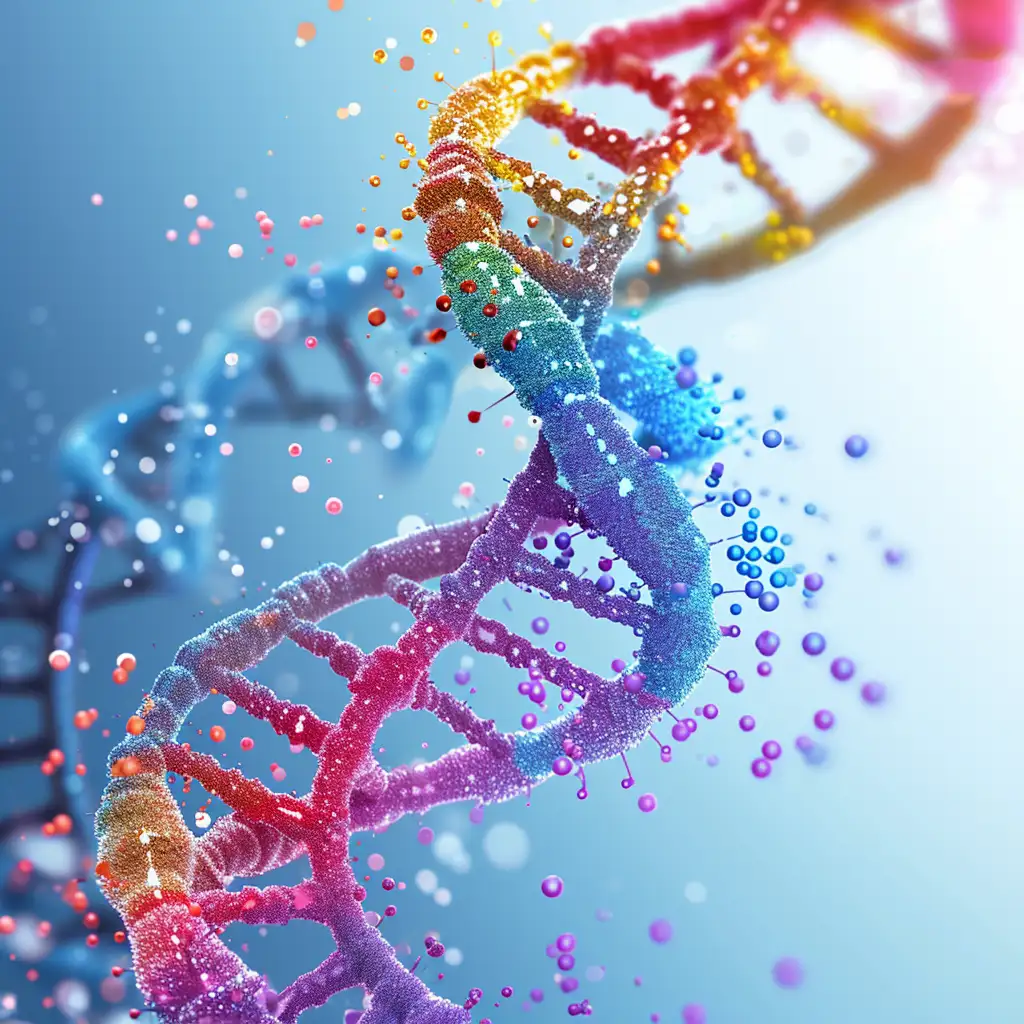Genetic markers, which are specific DNA sequences, are used to estimate ethnicity by comparing an individual’s DNA with known reference populations. The comparison of genetic markers and ethnicity estimates helps determine the prevalence of markers shared with certain ethnic groups, reflecting historical migration and reproduction patterns.
Key Takeaways
- Role of Genetic Markers: Genetic markers, which are unique DNA sequences, play a crucial role in determining a person’s ethnic origins. These markers vary between individuals and are inherited from ancestors.
- DNA Ancestry Testing: This process involves analyzing genetic markers to determine an individual’s ethnic heritage with a high degree of accuracy. It compares the frequency of specific markers in an individual’s DNA with those in reference populations.
- Types of Genetic Markers: Different types of genetic markers are used in DNA testing, including single nucleotide polymorphisms (SNPs), mitochondrial DNA (mtDNA), and Y-chromosome DNA (Y-DNA). SNPs are the most commonly used markers for ethnicity estimation.
- Ethnicity Estimation Methods: Ethnicity estimates are based on the analysis of genetic markers and their distribution among different ethnic groups. Methods like SNP testing and admixture analysis are used to estimate ancestry.
- Accuracy of Ethnicity Estimates: The accuracy of these estimates can vary based on factors like the quality of the DNA sample, reference populations used, and the genetic diversity within ethnic groups. Ethnicity estimates are statistical probabilities and not absolute facts.
- Cultural and Biological Ancestry: It’s important to note that DNA testing provides information about biological ancestry, which may not always reflect an individual’s cultural or social identity, especially in cases of mixed ancestry.
- Personal and Emotional Significance: Understanding one’s ethnic origins through genetic markers can be a powerful emotional experience, offering a sense of belonging, identity, and pride. It also helps in connecting with familial roots and discovering connections to diverse ethnic backgrounds.
Genetic Markers and Ethnicity Estimates: An Overview
Genetic markers play a crucial role in determining ethnicity estimates through DNA ancestry testing. These markers are specific sequences of DNA that vary between individuals and are inherited from their ancestors. DNA testing can analyze these markers to provide insights into one’s ethnic origins and genetic ancestry.
Ethnicity estimates obtained through DNA testing are based on the analysis of genetic markers and the comparison of their frequency and distribution among different ethnic groups. The accuracy of these estimates can vary based on various factors, including the quality of the DNA sample and the reference populations used for comparison.
Understanding Genetic Markers
Genetic markers are variations in the DNA sequence that can be used to identify individuals and trace their ancestry. They are used in DNA testing for ethnic origins by comparing the frequency of specific markers in an individual’s DNA sample with those in reference populations. The more similar the genetic markers are to those of a particular ethnic group, the higher the probability that the individual has ancestry from that group.
There are different types of genetic markers used in DNA testing, including single nucleotide polymorphisms (SNPs), mitochondrial DNA (mtDNA), and Y-chromosome DNA (Y-DNA). SNPs are the most commonly used markers for ethnicity estimation, as they are the most abundant and variable type of marker in the genome.

Understanding Genetic Markers
In genetic testing for ethnic origins, genetic markers are the key to unlocking ancestral heritage. These markers are specific locations on a person’s DNA that can be used to identify their ethnic ancestry.
Genetic markers are inherited from both parents and can be used to trace ancestry back hundreds of years. They can be used to identify a person’s geographic origin, migration patterns, and even specific ethnic groups that they are related to.
When it comes to genetic ancestry markers, there are two main types: autosomal markers and haplogroup markers. Autosomal markers are inherited from both parents and can provide a broad picture of one’s ancestry. Haplogroup markers, on the other hand, are inherited from one parent and can provide a more specific picture of one’s ethnic origins.
Genetic testing for ethnic origins involves analyzing these markers and comparing them to a database of known genetic markers associated with different ethnic groups. Comparing the markers in a person’s DNA to these known markers allows scientists to estimate their ethnic ancestry.
Overall, understanding genetic markers is crucial for accurate genetic testing for ethnic origins. By identifying and analyzing these markers, scientists can unlock a wealth of information about a person’s ancestral heritage.
Ethnicity Estimates and DNA Ancestry Testing
DNA ancestry testing is a rapidly growing industry, with many companies offering services that provide insights into one’s ethnic heritage. These tests use genetic markers to estimate the percentage of an individual’s DNA that comes from different ethnic groups.
The process involves comparing an individual’s DNA to reference samples from different ethnic populations. The DNA sequences are then analyzed to identify specific genetic markers that are associated with particular ethnic groups.
Ancestry Estimation Using DNA
There are different methods used to estimate ancestry using DNA testing, such as single nucleotide polymorphism (SNP) testing and admixture analysis. SNP testing involves analyzing a large number of genetic markers to determine the specific ethnic groups that an individual may be descended from.
Admixture analysis involves examining an individual’s DNA for evidence of mixed ancestry. This method uses statistical models to estimate the percentage of an individual’s DNA that comes from different populations.
Ethnicity Estimation Accuracy
While DNA ancestry testing can provide valuable insights into one’s ethnic heritage, it is important to note that the results are estimates and not absolute facts. The accuracy of ethnicity estimates depends on several factors, such as the quality and quantity of reference samples used, the algorithms used to analyze the data, and the genetic diversity within ethnic groups.
It is also important to consider that ethnicity estimates may not reflect an individual’s cultural or social identity, as DNA testing only provides information about biological ancestry. Additionally, ethnicity estimates may not be precise for individuals with mixed ancestry, as the algorithms used to estimate ethnicity may not accurately account for individuals who belong to more than one ethnic group.
Despite these limitations, DNA ancestry testing can be an interesting and informative way to explore one’s ethnic heritage and uncover possible connections to diverse ethnic backgrounds.

The Science Behind Ethnicity Estimates
Understanding the science behind ethnicity estimates is fundamental to comprehending DNA ancestry testing. Ethnicity estimates rely on a significant number of genetic markers, which are specific locations on chromosomes where variations or mutations occur. These variations are associated with different ethnic or regional groups and are used to determine a person’s ethnic heritage.
For instance, genetic markers associated with Ashkenazi Jewish ancestry can be used to identify individuals of Eastern European Jewish descent. Similarly, genetic markers linked to West African populations can pinpoint African American ancestry with high accuracy.
The accuracy of ethnicity estimates depends on the number and quality of genetic markers used in the analysis. A larger number of genetic markers provide a more detailed and comprehensive picture of a person’s ethnic origins..
Factors Affecting Ethnicity Estimates
While DNA ancestry testing using genetic markers can provide valuable insights into one’s ethnic heritage, it is important to understand that there are factors that can affect the accuracy of ethnicity estimates.
One significant factor is the reference populations used by testing companies to compare an individual’s genetic markers. These populations are typically selected based on demographic information, such as ethnicity or geographic location. If an individual’s genetic ancestry does not match closely to the reference populations used by the company, this can lead to errors or incomplete results.
Another factor is the quality and quantity of the DNA sample provided for testing. Poor quality samples may lead to inaccurate results or no results at all. Additionally, the accuracy of ethnicity estimates can be influenced by the method used for DNA testing and the algorithms used to analyze the results.
It is also important to consider that ethnicity estimates are just that – estimates. They are based on statistical probabilities and can vary depending on the specific markers used and the algorithms applied. While they can provide valuable insights, they should be viewed as one piece of a larger puzzle that can include genealogical research and personal knowledge of family history.
Overall, individuals should approach ethnicity estimates obtained through DNA ancestry testing with a critical eye and consider the potential limitations and sources of error.
Genetic Markers for Determining Ethnicity
Genetic testing for ethnic origins relies on the analysis of specific genetic markers associated with different ethnic groups. These markers are identified through the analysis of a person’s DNA, which contains unique variations that can provide insights into their ancestral heritage.
There are various types of genetic markers used in ancestry testing, including single nucleotide polymorphisms (SNPs), short tandem repeats (STRs), and mitochondrial DNA (mtDNA). SNP markers are the most commonly used in ethnicity estimation as they are abundant in the human genome and can be easily analyzed through DNA testing.
One of the most popular DNA ancestry testing companies, 23andMe, uses over 600,000 SNPs to estimate a person’s ethnicity. These SNPs are compared to reference populations from around the world to determine the most likely ethnic origins of an individual.
Other genetic markers, such as mtDNA, are inherited maternally and can provide insights into one’s maternal ancestry. On the other hand, Y-chromosome STR markers are inherited paternally and can provide information about one’s paternal ancestry.
Overall, the use of genetic markers in determining ethnicity through DNA testing has revolutionized the field of genealogy and provided individuals with a unique opportunity to uncover hidden connections to diverse backgrounds.
Genetic Markers: The Key to Unlocking Ancestral Heritage
Genetic testing for ethnic origins has become increasingly popular in recent years. This type of testing relies on genetic markers to provide insight into an individual’s ancestral heritage. Ethnic heritage analysis using genetic markers has helped people connect with their familial roots and discover connections to diverse ethnic backgrounds.
Analyzing specific genetic markers associated with different ethnic groups means DNA testing can provide individuals with a detailed ethnicity estimate. Ethnic heritage analysis using genetic markers can reveal unexpected connections to diverse ethnic backgrounds. It can also provide valuable information about an individual’s genealogy and family history.
Understanding one’s ethnic origins can be a powerful emotional experience. It can provide a sense of belonging, identity, and pride. Genetic markers are key to unlocking these connections and helping individuals trace their ancestral heritage.
Unlocking Hidden Connections
Examining genetic markers means individuals can uncover hidden connections to diverse ethnic backgrounds. Ethnic heritage analysis using genetic markers can help individuals gain a greater understanding of their family history, explore cultural traditions, and connect with distant relatives.
For example, a person may have grown up believing they were of European descent, only to discover through DNA testing that they have significant ancestry in Africa, South America, or Asia. This newfound knowledge can provide a deeper sense of identity, culture, and belonging.
Exploring Ethnicity through Genetic Markers
Ethnic heritage analysis using genetic markers involves examining specific genetic markers that are associated with different ethnic groups. Certain genetic markers, such as mitochondrial DNA and Y-chromosome DNA, are inherited solely from one’s mother or father. Other genetic markers are inherited from both parents.
Analyzing a person’s DNA using these genetic markers makes it possible to estimate the percentage of genetic material that can be traced back to different ethnic groups. Ethnic heritage analysis can also identify specific regions where a person’s ancestors originated.
Uncovering Ancestral Connections
Genetic testing for ethnic origins and ethnic heritage analysis using genetic markers are powerful tools for uncovering ancestral connections. These tests provide a window into an individual’s ancestral past and can connect them with a diverse array of ethnic groups. Through genetic testing, individuals can gain a deeper understanding of their familial roots, cultural traditions, and personal identity.
Overall, genetic markers are the key to unlocking ancestral heritage. By exploring genetic markers and their significance in determining ethnicity, individuals can gain a greater appreciation of their family history and cultural heritage.
Evaluating Ethnicity Estimates: Understanding the Results
DNA ancestry testing has become increasingly popular, offering individuals the chance to gain insights into their ethnic origins. However, it is important to understand that ethnicity estimates obtained through DNA testing are not always 100% accurate.
The accuracy of ethnicity estimates can be influenced by various factors, such as the size and quality of the reference database used for comparison and the specific genetic markers analyzed. Additionally, ethnicity estimates may be affected by the complexity of an individual’s ancestry, particularly in cases where individuals have a mixed ethnic background.
It is essential to interpret and evaluate ethnicity estimates with caution. Individuals should consider their ethnicity estimates alongside other factors, such as their family history and cultural background. Additionally, it is recommended to take multiple DNA tests from different providers to obtain a more comprehensive understanding of one’s ethnicity.
While ethnicity estimates obtained through DNA testing are not definitive, they can provide valuable insights into an individual’s ancestral past. By understanding the limitations and potential sources of error in ethnicity estimation, individuals can make informed decisions about how to use the information obtained through DNA ancestry testing.

Genetic Markers: The Key to Unlocking Ancestral Heritage
Genetic markers are the key to unlocking one’s ancestral heritage. Through ethnic heritage analysis using genetic markers, individuals can discover their ethnic origins and the diversity of their ancestral heritage.
DNA testing for ethnic origins is a powerful tool that can provide individuals with insights into their ethnic heritage. By analyzing genetic markers, DNA ancestry testing can estimate one’s ethnic origins and reveal connections to diverse ethnic backgrounds.
Understanding one’s ethnic heritage can have a significant impact on an individual’s sense of identity and belonging. It can also provide important information about potential health risks associated with specific ethnic backgrounds.
Genetic markers are at the core of DNA ancestry testing. These markers are specific variations in an individual’s DNA sequence that are associated with particular ethnic groups. Analyzing a person’s genetic markers means DNA testing can provide estimates of their ethnic heritage.
Ethnic heritage analysis using genetic markers is not only about discovering one’s ancestral past but also about building connections with diverse cultures. It is an opportunity for individuals to explore and celebrate their ethnic heritage.
The power of genetic markers in determining ethnic heritage is undeniable. Ethnic heritage analysis using genetic markers can provide individuals with a deeper understanding of their ancestral origins, helping them to connect with their cultural heritage and embrace their diversity.
The Significance of Ethnic Heritage Analysis
Ethnic heritage analysis using genetic markers can provide individuals with a deeper understanding of their ancestral heritage. It can help them to connect with their cultural identity and embrace the diversity of their ethnic background.
By unlocking their ethnic heritage, individuals can discover the connections between their ethnic background and their cultural traditions, customs, and values. They can learn about their family history and build connections with their ancestors.
Ethnic heritage analysis can also provide insights into potential health risks associated with specific ethnic backgrounds. Understanding one’s ethnic heritage can help individuals make informed decisions about their health and well-being.
Unlocking Your Ancestral Heritage with Ethnic Heritage Analysis
Genetic markers are the key to unlocking ancestral heritage and discovering the diversity of one’s ethnic background. Ethnic heritage analysis using genetic markers can reveal unexpected connections to diverse ethnic groups, providing individuals with a deeper understanding of their ancestral past.
Through DNA ancestry testing, individuals can explore their ethnic heritage and discover their unique cultural identity. They can connect with their diverse ethnic background and celebrate their ancestry.
Unlocking your ancestral heritage with ethnic heritage analysis is an opportunity to embrace the diversity of your ethnic background and connect with your cultural identity. It is an opportunity to celebrate your ancestry and learn about your family history.
Exploring Ethnicity through Genetic Markers: A Personal Journey
For John Smith, understanding his ethnic heritage was always a mystery. Growing up, he was told that his family had Irish and English roots, but beyond that, he had no idea where he came from.
Curious about his ancestry, John decided to take a DNA ancestry test. He was surprised to learn that the test analyzed specific genetic ancestry markers to provide an estimate of his ethnic origins.
The test results showed that John was 55% Irish, 40% British, and 5% other European. This information sparked a sense of pride in John, and he decided to delve deeper into his roots.
He began tracing his family tree and was amazed to discover that his ancestors had lived in Ireland for generations. He even found records of his great-grandparents’ immigration to the United States.
Armed with this newfound knowledge, John felt a deeper connection to his heritage and a greater sense of belonging. He continued to explore his ancestral past and eventually visited Ireland to learn more about his roots.
John’s experience is just one example of the power of genetic ancestry markers and the impact they can have on a person’s sense of identity.
“Thanks to DNA testing and genetic ancestry markers, I was able to uncover a part of my identity that had been a mystery. It’s amazing to think that my DNA holds the key to understanding my past and that of my family.” – John Smith
Conclusion
Genetic markers play a significant role in determining one’s ethnicity through DNA testing. These markers provide insights into an individual’s ancestral heritage, shedding light on their ethnic background and potentially uncovering hidden connections to diverse ethnic groups.
While ethnicity estimates based on genetic markers are generally accurate, there are limitations and potential sources of error that should be taken into consideration. Understanding the science behind ethnicity estimates and the factors that can influence accuracy is important for interpreting and evaluating DNA ancestry testing results.
Despite the limitations, ethnic heritage analysis using genetic markers remains a powerful tool for unlocking one’s ancestral past. By delving deeper into their ethnic origins, individuals can gain a better understanding of themselves and their place in the world.

My name is Anthony, the founder of Genealogical Footsteps. I have over 20 years of dedicated experience in family history and genealogy (although I am not a professional genealogist). I hold BA in history, and am considering further education (despite my age). My journey in genealogy has led me to remarkable discoveries and projects, particularly where my Cypriot genealogy is concerned. I am passionate about uncovering the stories behind names and have helped friends and family connect with their heritage, including those with Cypriot, Celtic, and Viking ancestry. Click here to read more about me.



